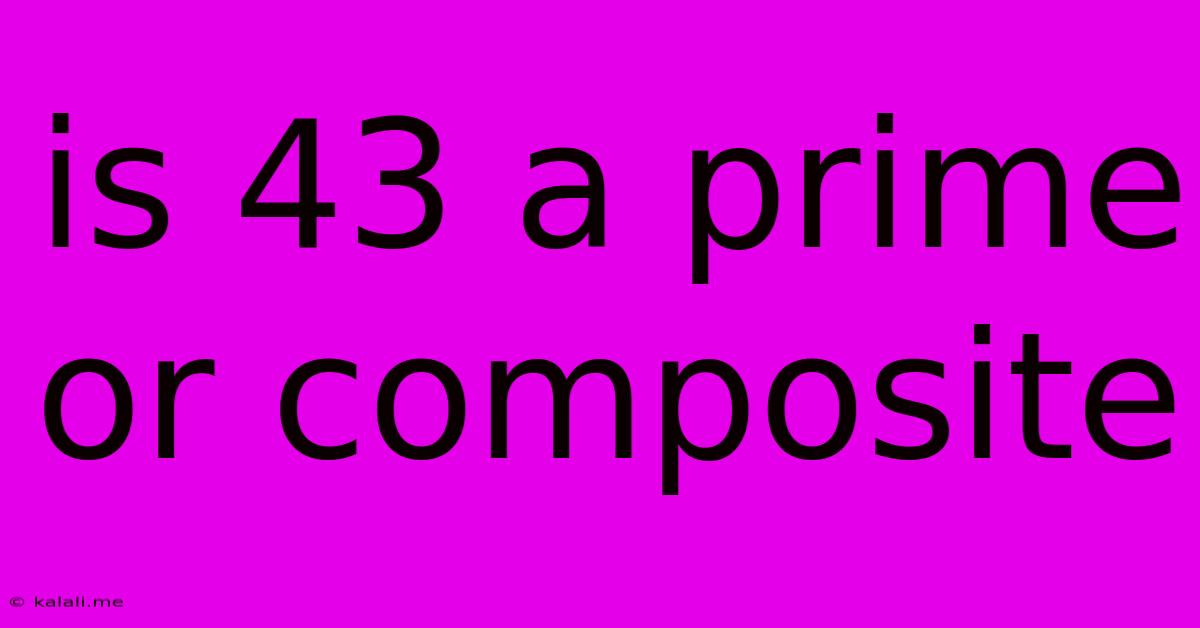Is 43 A Prime Or Composite
Kalali
Jun 13, 2025 · 2 min read

Table of Contents
Is 43 a Prime or Composite Number? A Definitive Answer
Determining whether a number is prime or composite is a fundamental concept in mathematics. This article will definitively answer the question: Is 43 a prime or composite number? We'll explore the definitions of prime and composite numbers and then apply them to the number 43. Understanding this will help solidify your grasp of number theory and improve your mathematical problem-solving skills.
What are Prime and Composite Numbers?
Before we classify 43, let's refresh our understanding of prime and composite numbers.
-
Prime Numbers: A prime number is a whole number greater than 1 that has only two divisors: 1 and itself. This means it's only divisible without a remainder by 1 and itself. Examples include 2, 3, 5, 7, 11, and so on.
-
Composite Numbers: A composite number is a whole number greater than 1 that has more than two divisors. In other words, it's divisible by numbers other than 1 and itself. Examples include 4 (divisible by 1, 2, and 4), 6 (divisible by 1, 2, 3, and 6), and 9 (divisible by 1, 3, and 9).
The number 1 is neither prime nor composite.
Determining if 43 is Prime or Composite
Now, let's focus on the number 43. To determine if 43 is prime or composite, we need to check if it has any divisors other than 1 and 43.
We can start by checking for divisibility by small prime numbers. We only need to check prime numbers up to the square root of 43, which is approximately 6.56. This is because if 43 has a divisor larger than 6.56, it must also have a divisor smaller than 6.56.
Let's check the prime numbers less than 6.56:
- 2: 43 is not divisible by 2 (it's not an even number).
- 3: The sum of the digits of 43 (4 + 3 = 7) is not divisible by 3, so 43 is not divisible by 3.
- 5: 43 does not end in 0 or 5, so it's not divisible by 5.
Since 43 is not divisible by 2, 3, or 5 (the prime numbers less than its square root), we can conclude that it has no divisors other than 1 and itself.
Conclusion: 43 is a Prime Number
Therefore, based on our analysis, 43 is a prime number. It fulfills the definition of a prime number by having only two divisors: 1 and 43. It cannot be expressed as a product of smaller whole numbers other than 1 and itself. Understanding prime numbers is crucial in various areas of mathematics, including cryptography and number theory.
Latest Posts
Latest Posts
-
San Diego State University Sat Requirements
Jun 14, 2025
-
Movement Of The Earth Around The Sun Is Called
Jun 14, 2025
-
Application For The Post Of Teacher
Jun 14, 2025
-
Which Of The Following Is A Nonrenewable Energy Resource
Jun 14, 2025
-
What Is The Square Root Of 0 09
Jun 14, 2025
Related Post
Thank you for visiting our website which covers about Is 43 A Prime Or Composite . We hope the information provided has been useful to you. Feel free to contact us if you have any questions or need further assistance. See you next time and don't miss to bookmark.